Essential Guide to Career Step Medical Coding Certification Success
What is a Medical Coding Certification?
Obtaining a medical coding certification is a necessity for anyone who wants to excel in the healthcare sector. In 2025, the value of a skilled medical coder will soar alongside job opportunities, making certification even more critical. It stands as a mark of a career achieved and ensures that medical, insurance, and other relevant records are maintained accurately.
With the impending shift to the ICD-11 coding systems and the integration of AI into healthcare documentation, medical coders who hold certifications are slated to have the upper hand in hiring. Certified medical coders are the preferred candidates for hospitals, insurance companies, and outpatient facilities because they can adjust to the changing healthcare policies.
In this guide, I will introduce various certification paths, study methodologies, networking options, exam prep, and industry insights necessary to be a successful medical coder in 2025.
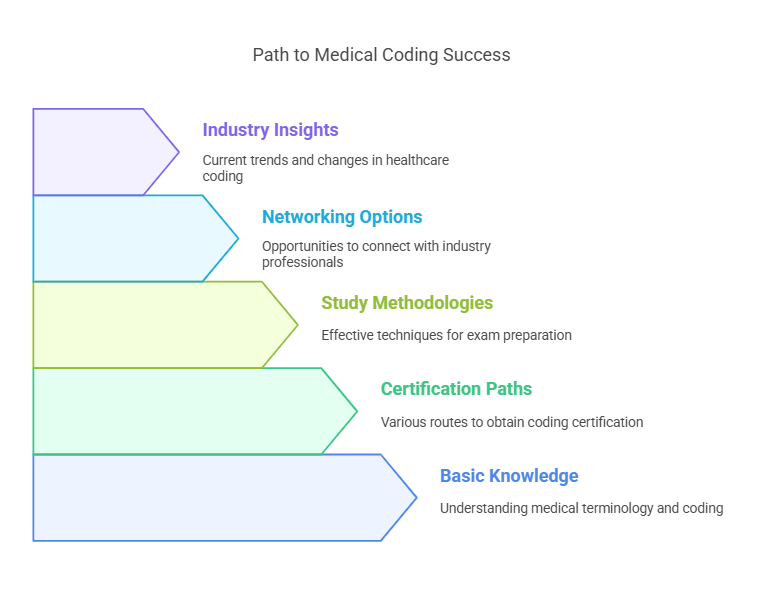
Available Options and Pathways for Certifications
Your career aspirations determine the most applicable pathway to follow among the multiple certification options offered. Some of the most prestigious medical coding certifications are:
Certified Professional Coder (CPC)
This certification is issued by the American Academy of Professional Coders (AAPC) and is suitable for outpatient and physician-based medical coding.
Certified Coding Specialist (CCS)
The American Health Information Management Association (AHIMA) offers this certification for those who wish to practice in a hospital.
Certified Inpatient Coder (CIC)
This code is for specialty coding for inpatient hospital services.
Certified Outpatient Coder (COC)
This is used for coding in outpatient facilities such as ambulatory surgical services.
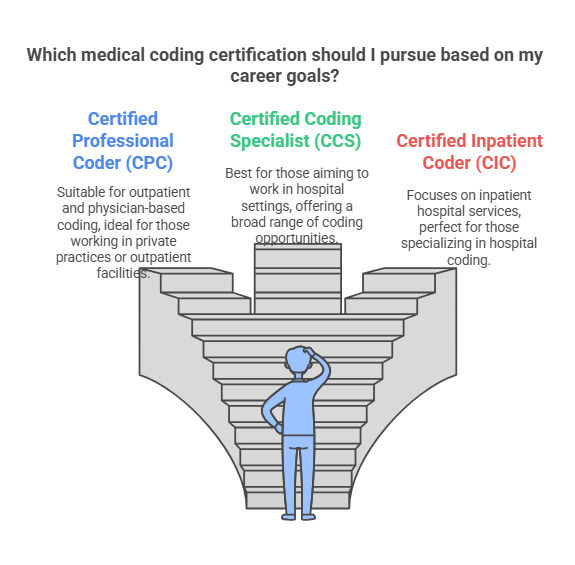
Certified Risk Adjustment Coder (CRC)
This is suitable for professionals who practice risk adjustment coding for value-based care.
CareerStep’s Medical Coding Training department prepares students to pass the CPC exam, which, even in 2025, continues to command the respect of many in the industry. Moreover, additional coding specialty areas, such as risk adjustment coding and medical auditing, enable medical coders to enhance their earning potential and broaden their career prospects.
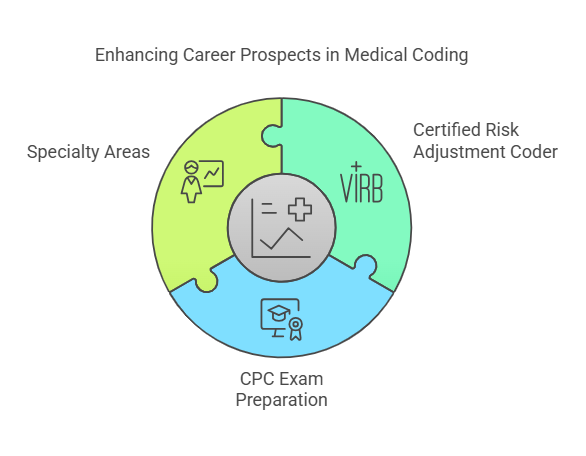
The Shift to ICD-11 Expected in 2025
With the implementation of ICD-11, medical coders need to utilize new coding updates. The change impacts documentation, billing, and compliance activities, requiring the engagement of new learning methodologies. The Centers for Medicare & Medicaid Services (CMS) is responsible for the issuance of notices regarding ICD-11 implementation updates within the United States. For further information, please visit CMS.gov.
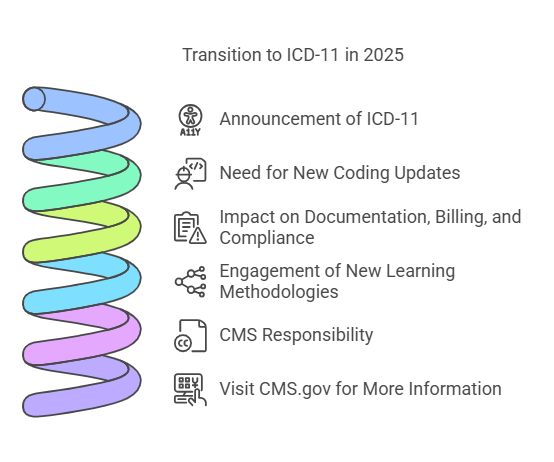
Exam Preparation Techniques
How to Get Through Your Medical Coding Certification Exam in 2025
First and foremost, obtaining certification involves preparing for the exam and studying consistently. Here are some effective strategies:
Designate Target Study Areas – Identify range-based topics and set weekly targets.
Online CQA Preparation Resources – Study guides, flashcards, and even mock exams are provided on official subsidized websites for medical coding.
Role-play Real-Life Coding Situations – Reviewing casework will bolster your practical skills.
Join a Study Group – Network with other students and professionals in the field of coding for debate on difficult subjects.
Practice Tests – Check your level of preparation under real conditions.
For free official coding guidelines and practice tests, visit the National Library of Medicine (NLM) at NLM.gov.

Employment Opportunities and Salary Expectations in 2025
The job opportunities for medical coders are expected to grow by nine percent from 2024 to 2034, which is faster than many other fields. Certified coders will also experience relatively higher salaries and stability over time.
Possible Workplaces of a Medical Coder:
✅ Hospitals & outpatient clinics
✅ Health insurance companies
✅ Government-subsidized healthcare schemes (Medicare & Medicaid)
✅ Telemedicine and other businesses focused on remote billing
Salary Growth Potential for Medical Coders in 2025
Beginning (0-2 years): $40,000 - $50,000
Intermediate (3-7 years): $55,000 - $70,000
Advanced (8+ years): $75,000 - $90,000
The more complex work of risk adjustment coders and inpatient coders earns them a higher salary.
For official salary statistics and job outlook reports, check the U.S. Bureau of Labor Statistics (BLS): Visit BLS.gov.

Networking and Advancements in the Field
Professional networking is crucial for any field, including medical coding. Here’s how you can advance your career:
Join Professional Organizations – Organizations such as AAPC and AHIMA provide networking opportunities, offer free certifications, and even specific job openings.
Attend Industry Conferences – Staying updated on coding alterations, law updates, and AI developments will keep you ahead of competitors.
Engage in Online Forums – Participate in medical coding communities and discussion groups on LinkedIn.
Networking can help connect people to find mentors, earn better positions, maximize salaries, and build overall brighter careers.
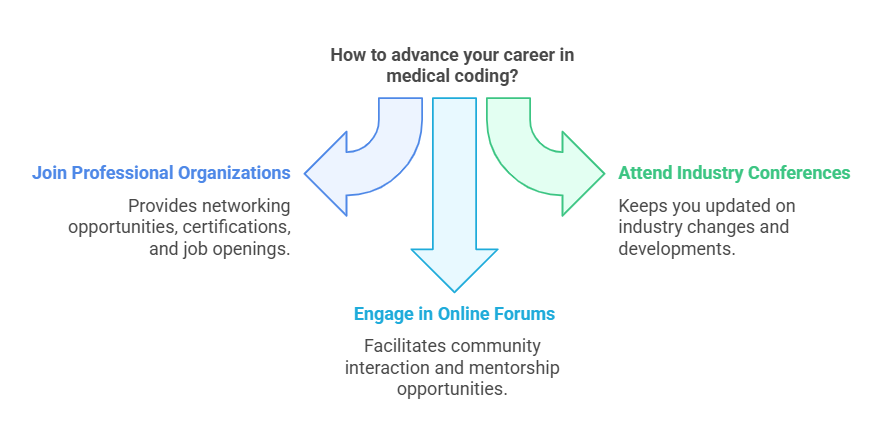
Renewing Certification
Certification renewal requires acquiring Continuing Education Units (CEUs), which can be achieved through:
✓ Attending approved workshops and seminars
✓ Participating in government training programs
✓ Subscribing to medical coding journals
✓ Online courses on coding updates
For a certification to remain relevant and active, professionals must stay updated on healthcare compliance regulations.

Future Trends in Medical Coding
Some changes to look out for in the next decade include:
The introduction of AI, automation, and data science to improve productivity in medical billing and coding.
AI assistance in medical coding will lead to more accuracy and efficiency while reducing manual work.
Growth of remote coding jobs with the rise of telehealth services.
Implementation of ICD-11 will modify the coding format.
Insurance claims are becoming more account-centered, which will impact claim processing systems.
In an ever-changing field, technological advancements will replace traditional methods. Those who adapt and upskill will secure better career opportunities.
Conclusion
Becoming a certified medical coder in 2025 and beyond provides employment opportunities, stable careers, and remote work flexibility. With advancements in healthcare and the rise of AI, pursuing medical coding certifications is a smart choice for those looking to enhance their skills and stay competitive in the industry.
By preparing adequately, staying informed about industry shifts, and following this guide, you can thrive in the field of medical coding.
